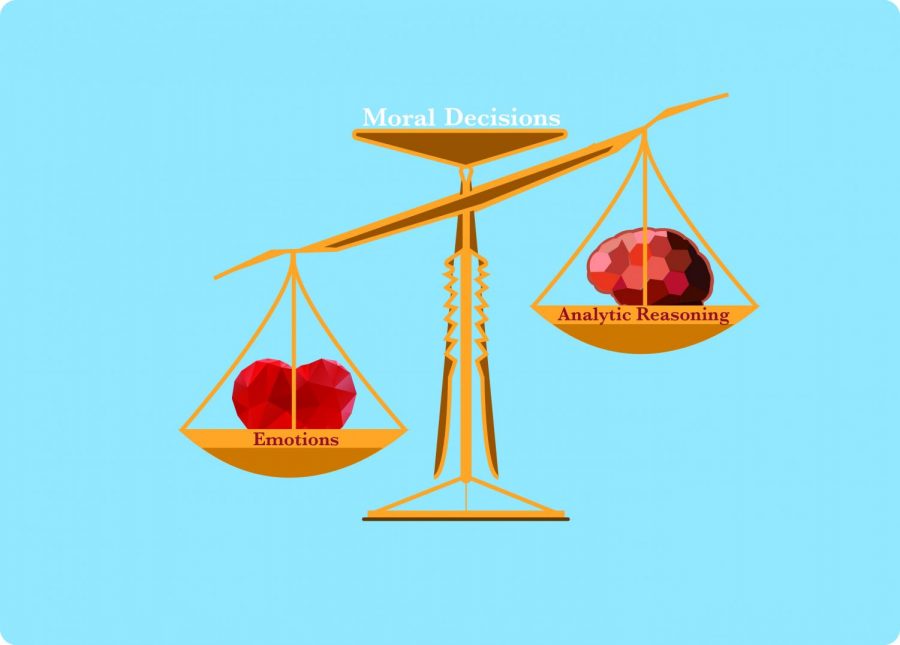Moral decision-making influenced by gender
Moral dilemmas
April 20, 2015
Is it moral to end one life in order to spare five?
Dilemmas like this, as well as the process used to arrive at a decision, are heavily influenced by gender, according to “Gender Differences in Responses to Moral Dilemmas,” a study published in the April edition of the Personality and Social Psychology Bulletin. Researchers used a meta-analysis to reevaluate 6,100 responses from 40 consulting studies to determine how one’s gender can influence difficult moral decision-making. They reported that men and women evaluate and weigh the outcomes of ethical dilemmas in different ways. The studies in the analysis presented decisions about these dilemmas, which are generally informed by two philosophies: An ethical dilemma that is decided by separate social and cultural rules is deontological, while a utilitarian decision considers relative benefits and number of beneficiaries of the prospective action.
“Women were found to have stronger deontological inclinations, whereas men and women were found to engage in similar levels of utilitarian inclinations,” said lead author Rebecca Friesdorf, a master’s student in social psychology at Wilfred Laurier University. “Women were fully aware that killing one to save five, in terms of math, really you’re getting a better outcome by saving the five, but they had a strong aversion to doing the harm, to killing the person, and that’s what seems to be driving the differences in the decision.”
The studies that researchers analyzed presented two scenarios with different outcomes to evaluate if subjects were making deontological or utilitarian decisions.
These findings supported previous research that establishes gender differences in moral choices, according to Friesdorf.
“I wouldn’t say we were surprised, but it was neat to see how strongly it was coming out in response to the moral dilemma,” Friesdorf said. “It did make sense with past research, which has found that men and women don’t differ very much in terms of the cognition [or] in terms [of] how well they reason with most things, but we know with things like empathy or relating emotionally to other people, women tend to do those things more than men.”
Having more women in traditionally male-dominated decision-making positions would lead to more diverse outcomes, according to Paul Conway, co-author and a professor of psychology at the University of Cologne in Germany.
“If you have primarily men making decisions, then they will mainly focus on the logical, rational outcomes of the activity,” Conway said. “They sometimes might look at women and say, ‘Oh women, they’re not thinking as hard as the men are,’ and that’s not true. Our data shows clearly that women are thinking in a similar way that men are thinking. Creating a better gender balance in decision-making bodies like Congress would be helpful for that to introduce a wider variety of opinions.”
Research supports that women will likely have more empathy in the case of either outcome regardless of the utility of the decision, according to Conway.
“Women tend to have a stronger emotional reaction to the harm that will be dealt,” Conway said. “They can more vividly imagine the people on the ground and their perspective and how that is bad. Men are less likely to appreciate that element, and I think if you’re going to make good moral decisions, you should think more carefully about multiple perspectives.”
Both biological and social factors contribute to the distinction between male and female decision-making, according to Conway.
“There’s links between how much testosterone people have and how willing they are to cause harm to other people,” Conway said. “There’s [also] really important social distinctions. For example, from a young age, girls get more feedback from the important people in their life, like their parents, that they should pay more attention to other people’s feelings. Usually, boys get less of this feedback.”
Decisions like this are classically represented by dilemmas such as the “trolley problem.” The trolley problem is a utilitarian moral dilemma in which five people are strapped to a trolley-car track with an out-of-control trolley approaching. There is a lever within reach that would divert the trolley to a track that only has one person strapped to it.
“This is a way of trying to say: How do we value different people when making a moral decision?” said Rami Gabriel, an associate professor of psychology at Columbia. “When we’re trying to decide on what is morality, there [are no scientific standards].”
Conway said decision-makers have a hard time considering that different perspectives can influence the choices others make when faced with dilemmas.
“What I want people to take away is that there’s different perspectives on moral dilemmas,” he said. “They’re equally valid. If you don’t agree with someone’s moral decision, it could be because they’re thinking about it in a different way than you are. When facing difficult moral decisions, like if we should bomb another country, and people are disagreeing over this point of view, we should listen carefully to each other and try and understand each other and why people feel the way they do because there could be
valid reasons.”







